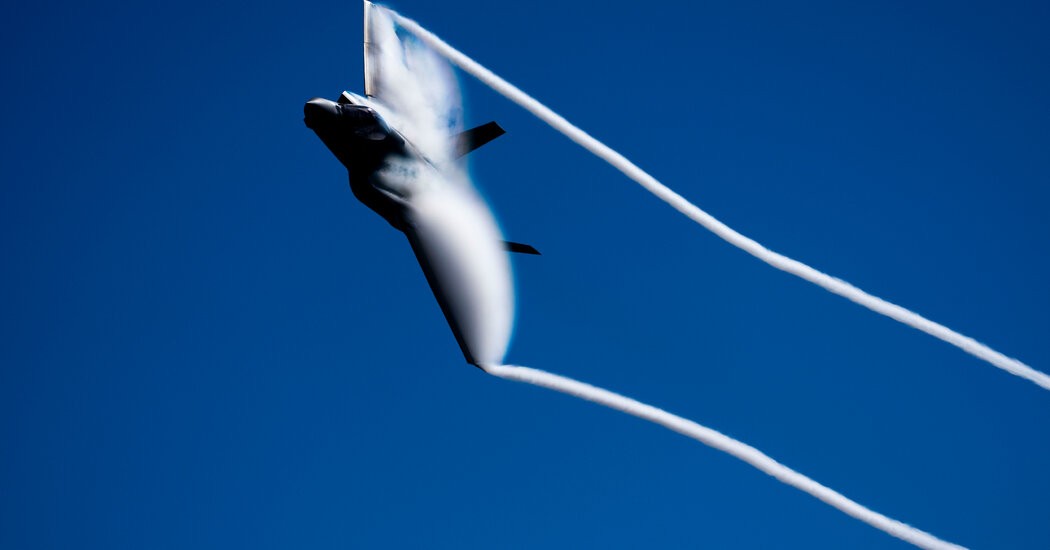
As the Trump administration tries to finalize a deal to sell advanced F-35 fighter jets to Saudi Arabia, a Pentagon intelligence report has raised concerns that China could acquire the warplane’s technology if the sales go through, according to people familiar with the assessment.
Pentagon officials who have studied the deal have expressed fears that F-35 technology could be compromised through Chinese espionage or China’s security partnership with Saudi Arabia, said the people, who have been briefed on the issues. Those risks were outlined in a broad report compiled by the Defense Intelligence Agency, a part of the Defense Department.
The Trump administration and Saudi Arabia have been trying to work out the final elements of an agreement in which U.S. weapons manufacturers would sell 48 F-35 jets to Saudi Arabia for billions of dollars. Defense Secretary Pete Hegseth was expected to approve the agreement, before it continued through an interagency review process, the people said.
Crown Prince Mohammed bin Salman, the de facto leader of Saudi Arabia, is expected to meet with President Trump at the White House on Tuesday. The top items on the agenda are the potential F-35 deal and a mutual defense agreement, U.S. officials said. Saudi Arabia is the biggest buyer of American weapons.
Prince Khalid bin Salman, the Saudi defense minister, wrote on social media on Tuesday that he had recently met with Mr. Hegseth, Secretary of State Marco Rubio and Steve Witkoff, Mr. Trump’s Middle East envoy. “We reviewed the Saudi-US relations and explored ways to bolster our strategic cooperation,” he said.
The Defense Intelligence Agency declined to comment when asked about its report on the F-35 deal. The embassy of Saudi Arabia in Washington did not reply to a request for comment.
“We will not get ahead of the president on conversations that are occurring ahead of time,” the White House said in a statement.
Prince Mohammed and his aides have also been prodding the United States to move forward on talks to approve helping Saudi Arabia develop a civilian nuclear program, an effort that has prompted U.S. officials to discuss whether the kingdom could use that nuclear technology to try to develop a nuclear weapon.
The Trump administration, like the Biden administration, has been trying to get Saudi Arabia to normalize relations with Israel. But that is unlikely to happen soon, given the high fatalities from the Israel-Hamas war and the Israeli government’s far-right policies toward Palestinians.
In addition to the concerns over China acquiring F-35 technology, the proposed sales also raise questions about whether the U.S. government would be compromising Israel’s regional military advantage. Israel is the only country in the Middle East that has F-35 jets, and it used them for airstrikes in Iran in October 2024 and June 2025.
Since the 1973 Arab-Israeli war, U.S. policymakers have sought to ensure that Israel maintains its “qualitative military edge” in the region. In previous administrations, there was a highly classified, monthslong interagency process to review whether proposed weapons sales in the region would be consistent with that.
Congress says the United States must ensure that Israel can defeat “any credible conventional military threat” while sustaining “minimal damage and casualties.”
In 2020, the first Trump administration agreed to sell F-35 jets to the United Arab Emirates as part of a deal to get that nation to normalize diplomatic relations with Israel in the Abraham Accords. Some U.S. officials objected to the sales because of the U.A.E.’s close partnership with China and because of concerns that Israel’s military advantage would be weakened.
The Biden administration suspended the deal in early 2021 to review it, mainly out of fear that China could acquire the F-35 technology if the jets were in the U.A.E. The United States then gave the U.A.E. a list of demands, which included installing kill switches in the jets so that the U.S. government could render them inoperable if necessary. Emirati officials considered the demands too onerous, and the deal fizzled.
The same concerns have arisen with Saudi Arabia. U.S. officials are discussing whether to place safeguards on the F-35 technology, though it is unclear what would be enshrined in a sales agreement and what suggestions the Pentagon’s intelligence report lays out, if any.
China and Saudi Arabia have some military ties. The Chinese military is helping Saudi Arabia build ballistic missiles and acquire more capable ones, as well as operate them. Democratic lawmakers described those concerns in a letter to President Joseph R. Biden Jr. in June 2022, before his first trip to the kingdom.
The Saudis had bought short-range ballistic missiles from China for years, and they recently began purchasing more capable Chinese missiles that can travel farther. They also started to acquire the technology to create their own components, set up production facilities and conduct test launches, with the apparent goal of being able to produce their own missiles, U.S. officials said.
Jeffrey Lewis, an arms control expert at the Middlebury Institute of International Studies in Monterey, Calif., said in an interview that he had seen satellite images of a missile test site in Saudi Arabia that was a smaller version of a Chinese one.
For Saudi Arabia, acquiring the F-35 — America’s premier fighter jet — would give its air force major advantages in stealth and would help its pilots assess a complex battle space in ways that its existing fighter fleet cannot, said Gareth Jennings, the aviation editor of Janes, the defense intelligence firm.
“In a nutshell, the F-35 represents the pinnacle of Western combat aviation in terms of both capabilities and prestige ‘bragging rights,’” he said.
The prowess of F-35s was on full display in Israel’s 12-day war with Iran in June. While the Israeli military has not described in detail the aircraft’s role in that conflict, the F-35’s ability to destroy some of Iran’s air defenses enabled older Israeli jets “to operate over Iran with virtual impunity, and was likely a massive contributory factor to Israel’s success in that operation,” Mr. Jennings said.
Mr. Trump has boasted of his deal-making with oil-rich Saudi Arabia, especially when it comes to weapons. When the American president traveled to the kingdom in May, the White House announced it had secured $600 billion in deals with the Saudi government and companies there. The biggest package was $142 billion in arms sales. But some of the commercial projects promoted by the administration were already in the works before Mr. Trump took office.
Edward Wong reports on global affairs, U.S. foreign policy and the State Department for The Times.
The post U.S. Officials Raise Concerns About Saudi Arabia’s Bid for F-35 Jets appeared first on New York Times.



